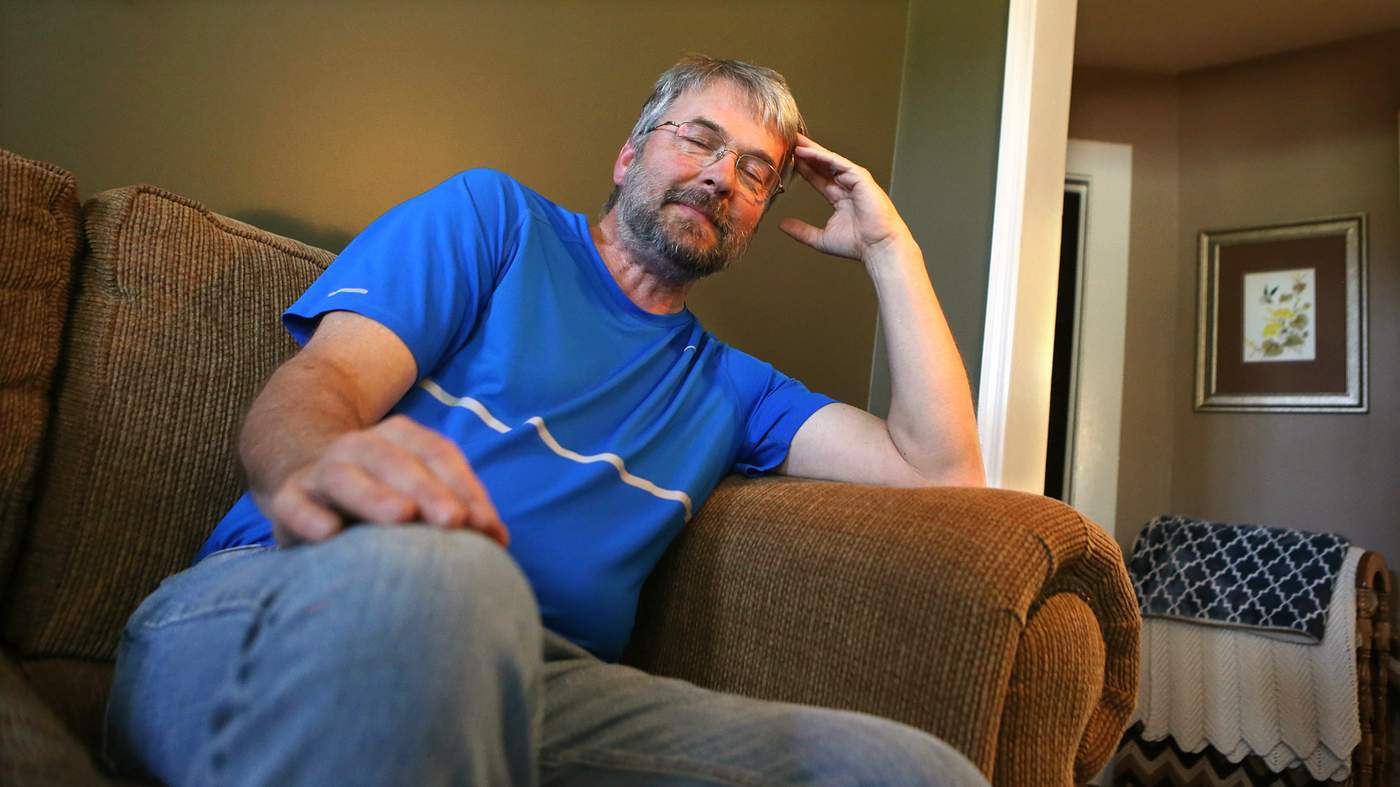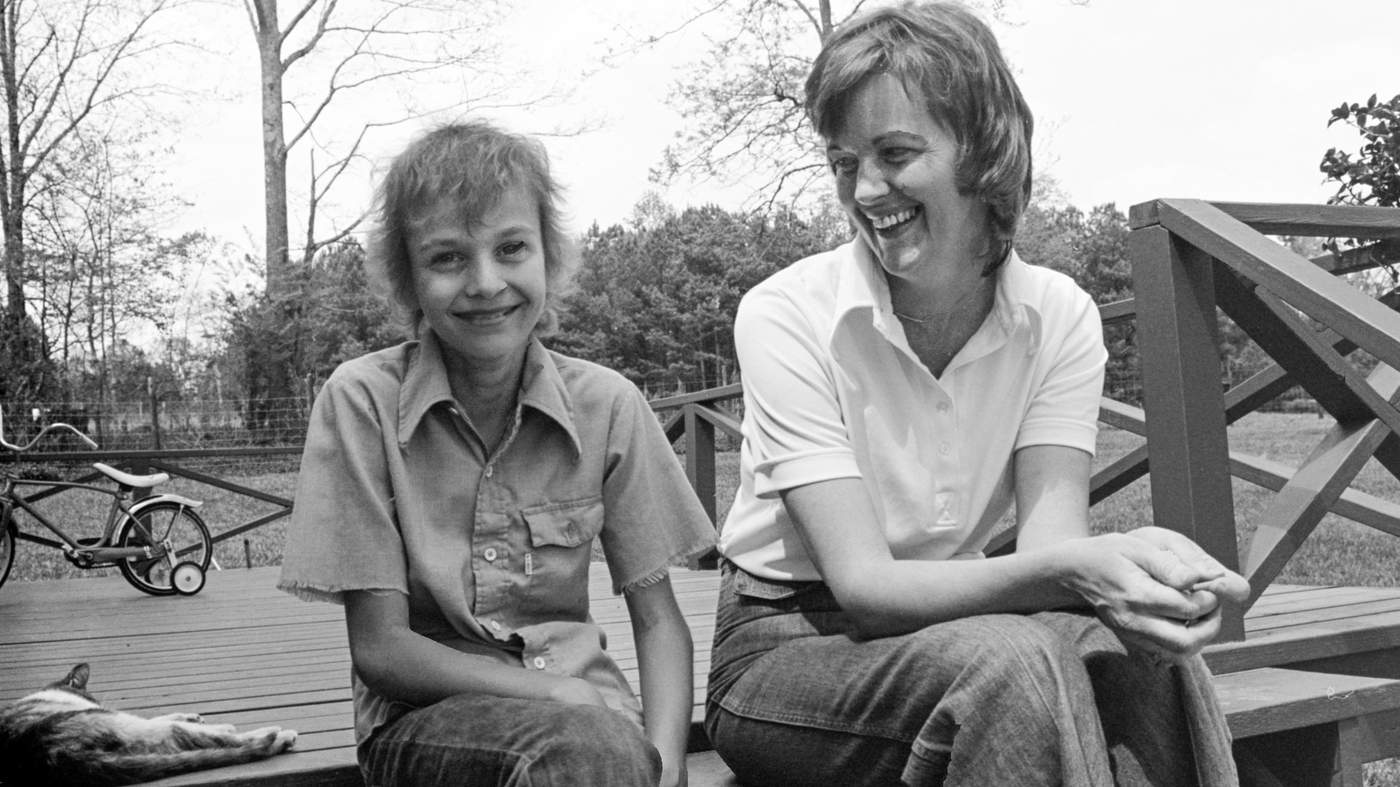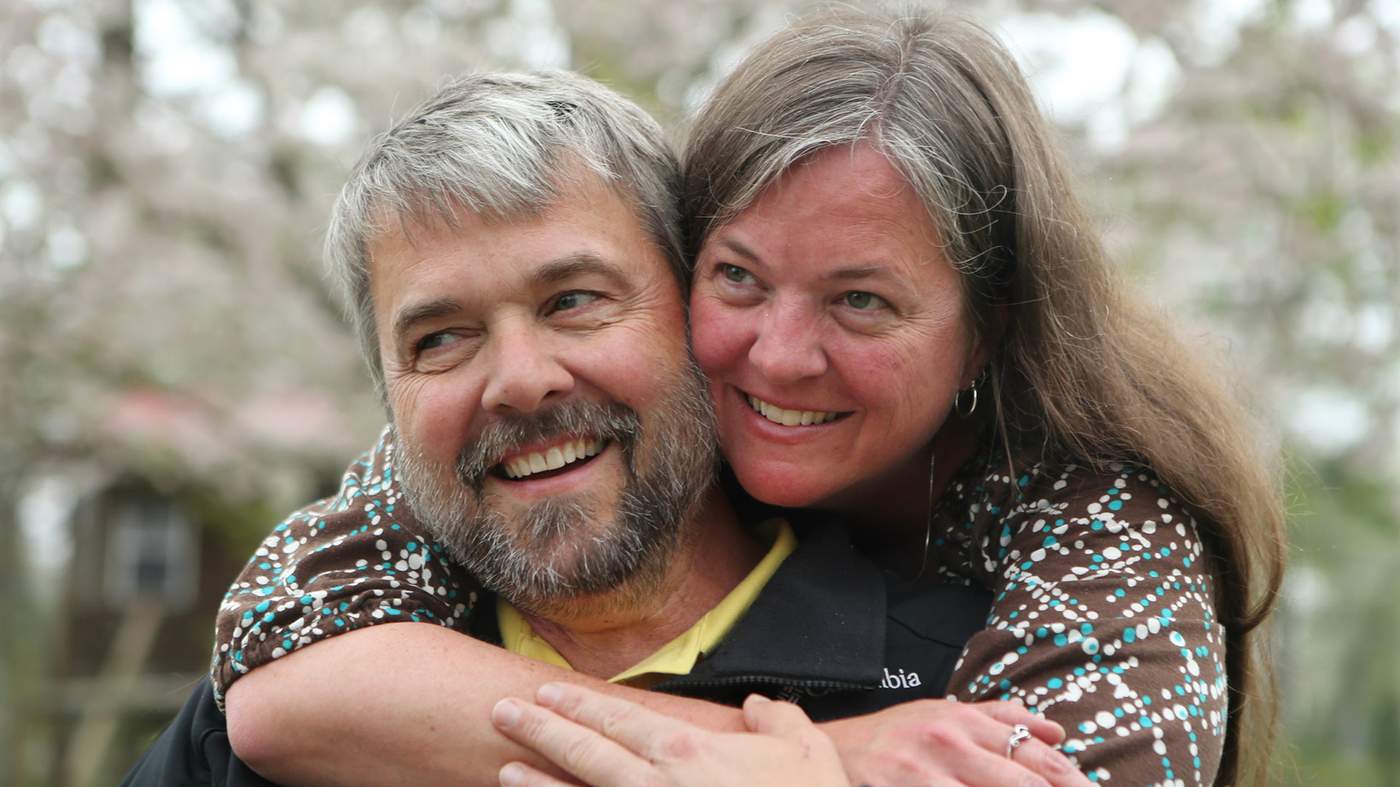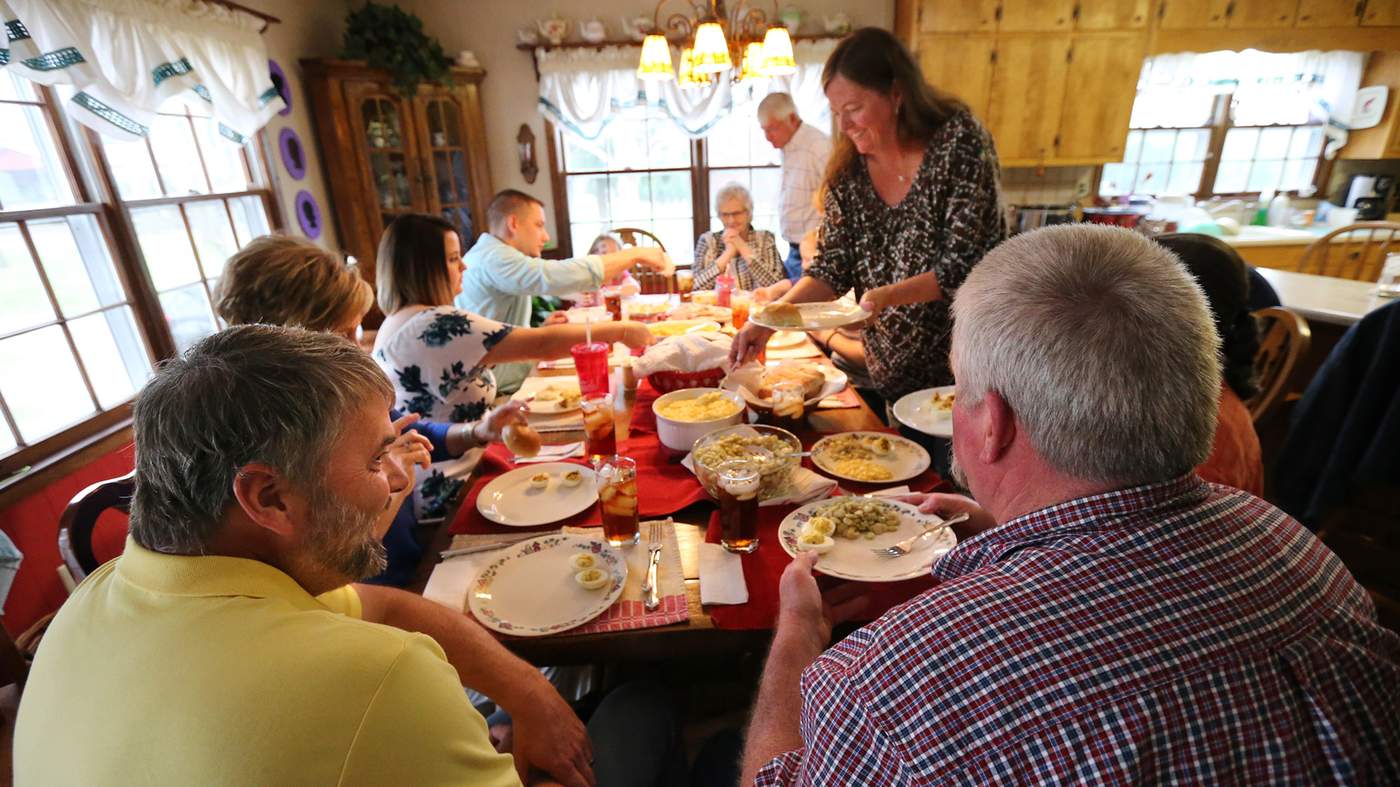Photo: Lea Holland received a speeding ticket Aug. 9, 1997, while driving the motorcycle with her brother, Tim Keel. The Mountie in Saskatchewan took this photo. Contributed by family
3
Siblings on the road
Tim was 8 years old when I was born, but he never made me feel like a pesky little sister. Maybe it was because of our age difference, or maybe it was a glimpse into the sweet man he would become.
Sometimes he and our older brother Ernie would play-fight over me. They’d pull my arms in opposite directions, arguing over whom I belonged to. There is Super 8 video of us building snowmen during a rare snowfall in February and of Tim, with his skinny legs and knit cap, dancing with me in the living room.
I was only 3 years old when Tim was diagnosed so it’s hard for me to say whether my memories of his cancer are things I actually remember or whether I remember them through pictures I’ve seen from that time. I don’t recall him being sick, but I remember playing in the stairwell while he and Mom visited the doctor and Dad shaving Tim’s head after he started losing his hair.
The possibility of losing my brother made my family close. But as I got older, so did my brothers. They both married and moved out of the house we shared on seven acres in Lawrenceville. We grew apart during my teenage years. They were living in the adult world and I was still in high school.
By 1996, I was working as a features writer at the Gwinnett Daily Post. Tim and Ernie had both gotten divorced and began planning a month-long motorcycle trip to the West Coast that summer. My brothers have always loved motorcycles. I don’t remember a time when they didn’t ride, starting with dirt bikes when they were young.
When I got wind of their plans, I finagled my way on their trip. I knew this would be a once-in-a-lifetime experience.
I met them en route in Rapid City, South Dakota, just outside of Sturgis, where we attended the 56th annual Sturgis Motorcycle Rally.
I rode on the back of Tim’s 1989 Harley-Davidson Electra Glide as we visited Mt. Rushmore in South Dakota, Devil’s Tower in Wyoming, Yellowstone National Park in Wyoming and Montana, Mt. Rainier in Washington and the Redwood forest in California. We rode across the Golden Gate Bridge into San Francisco, where we spent a few days visiting Dudley Perkins Harley Davidson, the iconic motorcycle shop opened in 1914, and the Haight-Ashbury district, where the Grateful Dead was born. We rode close to 2,000 miles together before I flew home.
Spending seven days on the road together made us feel close again. I watched with admiration as Tim took the lead and mapped out our routes every day. I still laugh at the memory of Ernie quizzing a rider with the Hell’s Angels about the helmet law in Idaho. Ernie’s Southern accent was so thick, he had to repeat the question three times before he was understood.
The trip went by so fast. When I got home, I pulled together all the photographs we took on the trip and made a photo album so I would never forget that incredible journey with my two brothers.
And like my brothers, I was now smitten by the thrill of two-wheeled transportation, so I got my motorcycle license.
The next summer, Tim planned a solo cross-country trip and I tagged along for two weeks, meeting him in Cody, Wyoming, and heading eastward through Canada. Occasionally I took the handlebars and Tim rode behind me.
One day we were riding through Maple Creek, Saskatchewan, when Tim leaned forward and whispered in my ear.
“Slow down, slow down, slow down.”
It was too late. Traveling toward us in the opposite lane was a Mountie. We flew right past him just before he made a U-turn and pulled me over.
He was friendly; I was guilty.
“You drove here all the way from Georgia?” he asked, noting our license plate.
We explained we were siblings on a road trip.
“Well, you know I have to write you a ticket ...”
While the Mountie wrote out the speeding ticket, Tim took the opportunity to embarrass his little sister by snapping photos of the momentous occasion.
In a photo album dedicated to pictures from that trip, there are several from that encounter, but the best one was taken by the Mountie who snapped a shot of us by his car.
Before he sent us on our way, the Mountie asked me if I had any plans to come back to Canada any time soon.
“Not likely,” I said.
They wouldn’t send anyone to Georgia to collect such a small amount of money if I never paid the ticket, he advised. So I didn’t.
As far as I know, there still may be a warrant out for me in Saskatchewan.
Photo: Tim Keel works with some of the hundreds of Leyland Cypress trees he has in grow pots at his property near their home in Social Circle. Curtis Compton / ccompton@ajc.com
5
A second diagnosis
Once Tim had recovered enough to undergo surgery, the doctors prepared to address the mass in his pelvis. It was determined to be benign and was removed. But during surgery, doctors discovered what appeared to be cancer on his small intestine. A pathology report revealed it was metastatic carcinoid cancer, a slow-growing tumor not often found until later in life because it typically takes a long time for symptoms to show up. Unfortunately it was inoperable, so he began receiving a monthly injection of a drug called Octreotide, which keeps it from growing.
“They make fun of me because I don’t even flinch when they give me the shot,” said Tim.
The doctors can’t say how long it would’ve been before the cancer took over Tim’s body if it hadn’t been found. But they believe they found it soon enough that as long as the treatments continue to work that the cancer shouldn’t be the cause of Tim’s death.
He’ll continue to get the monthly injections for the rest of his life as well as a twice-a-year MRI to check his abdomen and pelvis and his yearly checkup at Shepherd.
I’m sure most families would feel the way we did when Tim was diagnosed with cancer a second time. It seemed unfair.
“I was thinking that this can’t be happening again,” my dad said. “I pretty much think about it every day. We get questions from other people all the time about how Tim is doing. And that makes you think about it even more.”
So it’s never far from any of our minds.
“The cancer is not something you ever forget about,” said Tim. “Even since way back then, I never ever didn’t think about it. It never leaves your mind.”
Tim says he copes by praying a lot. When he’s driving and it’s quiet, he thinks about the accident and tries to remember what happened, although he knows he never will.
“There’s not much to do but just get on with things. It’s mind over matter,” he said. “It’s just something you have to teach yourself.”
I’ve noticed changes in my brother since his diagnosis. He seems quieter in large groups, observing more than participating. I often wonder what he’s thinking.
He attributes it to his brain injury. He says it changed his personality.
“I left the house one day and woke up a week and a half later in the hospital a completely different person,” he said. “I’ve had to relearn things — how to deal with people, how to control my temper, how to rationalize things.
“I used to have it happen a lot more than I do now, but I just wake up mad and can’t explain why. Just mad all day and there was no reason why,” he said. “That happens to a lot of brain injury patients. And there’s no fixing it.”
When he first tried to return to work, his wife Leah would take him and do the shop’s bookkeeping at the same time so she could keep an eye on him.
“Many days, I’d have to make him leave because he’d get so overwhelmed and couldn’t handle the pressure,” she said. “He would lose it and start throwing stuff.”
I never witnessed these blowups, but I knew they happened.
“There are people who see me now and think I’m the same person, but I’m not,” Tim said.
The accident has made Tim and Leah re-evaluate their lives.
“We just enjoy life the best that we can,” she said. “We don’t live on a schedule.”
Photo: Tim Keel and his wife, Leah, take a spin on his Harley-Davidson on I-20 East near their Social Circle home. Motorcycles have been a part of Tim’s life since he was young. He has taken several cross country trips on the bike and owned a now-closed motorcycle tire shop with his brother, Ernie. Curtis Compton / ccompton@ajc.com
6
Looking to the future
When Tim was at Shepherd Center, doctors advised him to never ride a motorcycle again.
Well, doc, you can’t quit living, was Tim’s response.
At the very least, they said, stay off the bike for one year.
For someone who felt more alive on a bike than off, it was a tall order.
One day Tim went onto the back porch of his home in Social Circle and he found Leah crying. Everything they did revolved around motorcycles, she said, now it had been taken away. To compensate, they bought a Jeep with a removable top so they could feel the wind on their faces. But it wasn’t enough. Tim still missed being on two wheels.
So in 2012, one year after the accident, he bought another bike, a 2008 Kawasaki KLR. At first he just rode it around Social Circle to run errands. Later that year he bought another bike, a 2012 Harley Davidson Road Glide.
“It felt normal to be back on the bike,” Tim said. “Nothing had changed.”
Leah got her own bike, too. The two have taken a few short trips — to North Carolina and Florida — to see friends. Last summer, Tim took his first cross-country trip since the accident when he and Leah ventured to the Sturgis Motorcycle Rally.
It was tiring, but no more than usual, Tim said.
Tim left the motorcycle tire shop, and now he and Leah have started a small tree farm on 17 acres they own in Jersey. They plan to start building a new house there this year.
“Because of the accident, we’ve taken into account certain things that a lot of people wouldn’t think of,” Tim said. “We’re going to make sure we have larger doors that are wheelchair accessible, with showers and bathtubs, things like that.
“We don’t know where my health might be one day.”
But for now there will be more motorcycle trips, more travels in the Jeep, and Tim won’t be taking anything for granted.
Having endured so much, it might seem like my brother was cursed.
But Tim doesn’t see it that way.
“The wreck was actually a blessing,” he said. “I’m lucky and blessed. I can’t deny that one bit.”
ABOUT THE STORY
Having worked with Lea Holland for years in her capacity as a copy editor, I was delighted when she told me she wanted to write a Personal Journey about her brother’s ordeal. She was surprised when I suggested she write it from a first-person perspective as his sister. Two years later, after emotional interviews with family members and time spent considering her own feelings about her brother’s suffering, she delivered. The result is a powerful story about a family made stronger through tragedy and the power of a positive outlook.
Suzanne Van Atten
Personal Journeys Editor
personaljourneys@ajc.com

ABOUT THE REPORTER
Lea Holland joined the AJC in 2007. She is a section editor for the daily Living section. Previously she worked as copy editor, managing editor and web editor at Creative Loafing and copy desk chief at the Gwinnett Daily Post. She graduated from Auburn University in 1994 with a degree in corporate journalism.
ABOUT THE PHOTOGRAPHER
Curtis Compton joined the AJC as a photo editor in 1993 before returning to the field as a staff photographer. Previously he worked for the Gwinnett Daily News, United Press International and the Marietta Daily Journal. He has a bachelor’s degree from the University of Georgia and won a World Hunger Award for his coverage of the famine in Sudan.










Please confirm the information below before signing in.